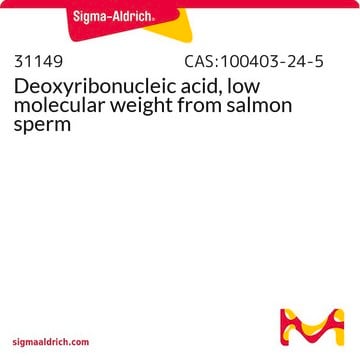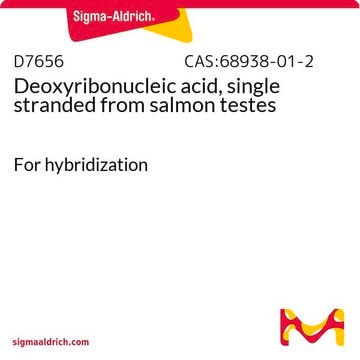R4018
Ribonucleic acid, transfer, phenylalanine specific from brewer′s yeast
Synonym(s):
Transfer RNA, Yeast Phe tRNA, tRNA
Sign Into View Organizational & Contract Pricing
All Photos(1)
About This Item
Recommended Products
grade
for molecular biology
form
lyophilized powder
mol wt
25 kDa
solubility
water: 2 mg/mL
storage temp.
2-8°C
General description
Transfer RNA is isolated from brewer′s yeast. This transfer RNA is specific for transfer of the amino acid phenylalanine.
The phenylalanine acceptor activity of 100% pure tRNA is 1,800 pmoles per A260 unit. Comparison of this number to lot-specific analysis may be used as an indication of product purity. Methods to further purify tRNA have been published.
The assay for this product is based on a published method. The activity is measured using a crude preparation of phenylalanyl transfer ribonucleic acid synthetase. The phenylalanine specific tRNA is used as a substrate for the enzyme in the assay.
This product is not suitable for use as carrier tRNA to aid in the ethanol precipitation of very small amounts of DNA. Product Nos. R 8508 and R 5636 are recommended for use as carrier tRNA for DNA purification and precipitation.
The phenylalanine acceptor activity of 100% pure tRNA is 1,800 pmoles per A260 unit. Comparison of this number to lot-specific analysis may be used as an indication of product purity. Methods to further purify tRNA have been published.
The assay for this product is based on a published method. The activity is measured using a crude preparation of phenylalanyl transfer ribonucleic acid synthetase. The phenylalanine specific tRNA is used as a substrate for the enzyme in the assay.
This product is not suitable for use as carrier tRNA to aid in the ethanol precipitation of very small amounts of DNA. Product Nos. R 8508 and R 5636 are recommended for use as carrier tRNA for DNA purification and precipitation.
Application
Suitable for use:
- As a tRNA standard
- As a substrate in tRNA synthatase assays
- As a substrate in other reactions involving tRNAs
Components
tRNA is provided as a lyophilized powder that is soluble in water at a concentration of 2 mg/ml.
Preparation Note
Prepared by method of Wimmer, E., et al., Biochemistry, 7, 2623 (1968).
related product
Product No.
Description
Pricing
Storage Class Code
13 - Non Combustible Solids
WGK
WGK 3
Flash Point(F)
Not applicable
Flash Point(C)
Not applicable
Personal Protective Equipment
dust mask type N95 (US), Eyeshields, Gloves
Certificates of Analysis (COA)
Search for Certificates of Analysis (COA) by entering the products Lot/Batch Number. Lot and Batch Numbers can be found on a product’s label following the words ‘Lot’ or ‘Batch’.
Already Own This Product?
Find documentation for the products that you have recently purchased in the Document Library.
W Yan et al.
The EMBO journal, 17(16), 4809-4817 (1998-08-26)
Correct folding of newly synthesized polypeptides is thought to be facilitated by Hsp70 molecular chaperones in conjunction with DnaJ cohort proteins. In Saccharomyces cerevisiae, SSB proteins are ribosome-associated Hsp70s which interact with the newly synthesized nascent polypeptide chain. Here we
Mariana Pavon-Eternod et al.
Nucleic acids research, 37(21), 7268-7280 (2009-09-29)
Increased proliferation and elevated levels of protein synthesis are characteristics of transformed and tumor cells. Though components of the translation machinery are often misregulated in cancers, what role tRNA plays in cancer cells has not been explored. We compare genome-wide
Tissue-specific differences in human transfer RNA expression.
Dittmar, K.A., et al.
PLoS Genetics, 2, 2107-2107 (2006)
Noa Aharon-Hefetz et al.
eLife, 9 (2020-12-29)
Different subsets of the tRNA pool in human cells are expressed in different cellular conditions. The 'proliferation-tRNAs' are induced upon normal and cancerous cell division, while the 'differentiation-tRNAs' are active in non-dividing, differentiated cells. Here we examine the essentiality of
Andrey Chursov et al.
Nucleic acids research, 41(Web Server issue), W486-W491 (2013-06-15)
Although multiple biological phenomena are related to temperature (e.g. elevation of body temperature due to an illness, adaptation to environmental temperature conditions, biology of coldblooded versus warm-blooded organisms), the molecular mechanisms of these processes remain to be understood. Perturbations of
Our team of scientists has experience in all areas of research including Life Science, Material Science, Chemical Synthesis, Chromatography, Analytical and many others.
Contact Technical Service








